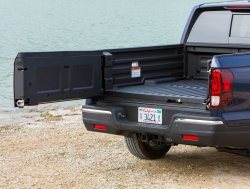
— A Honda Ridgeline tailgate wiring harness class action lawsuit alleges the backup camera fails because the wiring wears out and breaks.
Eight plaintiffs filed the Ridgeline tailgate wiring harness class action lawsuit alleging 2017-2019 Honda Ridgeline tailgates contain the defective harnesses that break.
The Ridgeline tailgates open the typical way and also swing open laterally.
According to the plaintiffs, the Ridgeline tailgate wire harness is made with several separate wires used to transmit power and data to the backup camera.
But when the Honda Ridgeline tailgate is opened, it allegedly pinches the wiring harness where the tailgate pivots, causing the wire coating to wear and break. This is allegedly caused by defective coatings on the wiring that cannot handle the wear and tear of opening and closing the tailgate.
According to the class action lawsuit, the backup cameras will fail once the wiring wears and breaks.
A Honda Ridgeline tailgate recall allegedly should have been issued by the automaker, but instead Honda has allegedly issued bulletins to dealerships about the tailgates.
In February, the National Highway Traffic Safety Administration opened an investigation into Honda Ridgeline backup camera problems following more than 40 complaints about 2017-2018 trucks. The investigation remains open.
Honda Ridgeline Tailgate Harness Lawsuit Partly Dismissed
Honda filed a motion to dismiss the Ridgeline class action which led to several claims being tossed, some permanently.
Honda told the judge the plaintiffs fail to plausibly allege the automaker knew their vehicles were defective before the plaintiffs purchased them. Honda also argues its conduct is exempt from liability under Michigan and Oklahoma Consumer Protection Acts.
Honda asserts consumer complaints posted to third-party websites, all but one of which were posted after the plaintiffs purchased their Ridgelines, do not show Honda had pre-sale knowledge of alleged tailgate wiring harness defects.
Honda also argues "vague and speculative" allegations of internal testing aren't enough to allege Honda knew of any alleged problems.
Judge George H. Wu agreed that allegations about consumer complaints and bulletins issued to dealers "are insufficient to plausibly impute knowledge of the defect onto Honda."
The judge notes the earliest dated complaint on a third-party website is dated July 10, 2018, but the rest of the complaints were posted in May 2019 and later. Only two Plaintiffs purchased their Ridgeline trucks from Honda dealerships after the single complaint posted on July 10, 2018.
And the four complaints to NHTSA the plaintiffs provide to the judge were submitted in January 2021, February 2021, April 2021 and May 2021, "well after any Plaintiff purchased a vehicle from a Honda dealership."
As for technical service bulletins issued to Honda dealers, all the TSBs were issued in 2019 with the earliest issued February 25, 2019.
According to the judge, all the plaintiffs bought their Honda Ridgeline trucks before February 2019, meaning the plaintiffs "allegations are not sufficient to allege that Honda had knowledge of the defect prior to any of the Plaintiffs’ purchases."
"Second, the Court is inclined to agree with Honda that Plaintiffs’ added allegations about Honda’s purported testing processes are conclusory, speculative, and do not plausibly allege how Honda might have known about the defect. As the Court noted in its previous Order, general allegations of pre-sale testing of a product do not necessarily support an inference that the defendant manufacturer knew of the defect before bringing the product to market." — Judge Wu
According to the judge, merely "stating that the manufacturer must have knowledge of a defect because the manufacturer must conduct testing is 'conclusory' and thus insufficient to establish the element of knowledge."
The judge also dismissed breach of express warranty claims from two Ridgeline customers when he ruled there are no allegations Honda refused to repair or replace the tailgate wiring.
The judge then moved on to breach of implied warranty claims and immediately dismissed one Washington claim because it is time-barred by state law.
However, the plaintiff alleges the statute of limitations is meaningless and should be ignored because of Honda's alleged fraudulent concealment of the supposed defects.
According to Judge Wu, the plaintiffs didn't present sufficient evidence that Honda committed fraud or concealed the alleged tailgate wiring harness problem.
Judge Wu also dismissed unjust enrichment claims made by all the plaintiffs.
The plaintiffs have now filed their third amended Honda Ridgeline tailgate wiring harness lawsuit.
The class action was filed by the following plaintiffs:
- David MacTavish (Massachusetts)
- Johnson Qu (Massachusetts)
- Margaret Webb (Pennsylvania)
- Paul Twomey (New Hampshire)
- Elvin Gomez (New York)
- Gerald Morlock (Michigan)
- David Skalla (Oklahoma)
- Larry Wall (Washington)
The Honda Ridgeline class action lawsuit was filed in the U.S. District Court for the Central District of California: MacTavish, et al., vs. American Honda Motor Co., Inc., et al.
The plaintiffs are represented by Ahdoot & Wolfson, PC, and Barnow and Associates, P.C.




